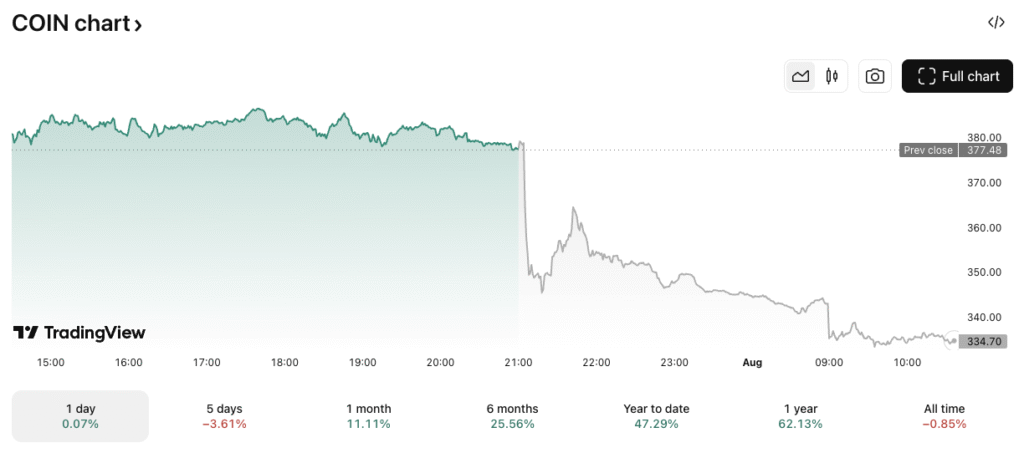Coinbase Expands Bitcoin Holdings and Plans Major Expansion: A Look into Q2 Developments
In a recent announcement following its Q2 earnings report, Coinbase CEO Brian Armstrong emphasized the company’s bullish stance on Bitcoin by revealing the acquisition of an additional 2,509 BTC. This strategic move amounted to approximately $222 million, increasing Coinbase’s total Bitcoin holdings to 11,776 BTC, acquired at an estimated cost of $740 million. As of June 30, the valuation of Coinbase’s Bitcoin stack stands at around $1.3 billion, yielding about $614 million in unrealized gains. This acquisition not only positions Coinbase among the top public Bitcoin treasury holders but also surpasses the holdings of Tesla, which retains 11,509 BTC.
This significant uptick in Bitcoin holdings has moved Coinbase from the 13th to the top 10 of public companies with the largest Bitcoin treasuries, illustrating a robust commitment to cryptocurrency amidst a fluctuating market. The broader landscape of Bitcoin treasury holders features various prominent companies, including Strategy, Mara, and Galaxy Digital, which collectively hold hundreds of thousands of BTC. Coinbase’s strategy aims to solidify its position not just as a leading exchange but also as a key player in the cryptocurrency investment space.
Despite the recent Bitcoin acquisition, Coinbase faced challenges in other operational areas. The company reported a loss of $307 million related to a data breach earlier this year, exacerbated by user data leaks via bribed offshore customer service representatives. Furthermore, the Q2 report highlighted a decline in spot trading volumes and revenue, with a staggering 30% drop in quarter-over-quarter trading volumes amounting to $237 billion. Transaction revenue also faced a 39% decline, reflecting the challenges Coinbase continues to navigate in the competitive crypto landscape.
However, amidst these economic challenges, Coinbase experienced a surge in net income, which rose to $1.43 billion from $66 million in the previous quarter. This increase can be attributed to the company’s diversification into various business lines, including its role in exchange-traded fund custody and the operation of its Ethereum Layer 2 network, Base. Such developments indicate that while the immediate trading landscape may be struggling, Coinbase’s comprehensive business strategy is designed to leverage multiple avenues of revenue.
In conjunction with these earnings results, Coinbase also introduced expansive plans to evolve into an "everything exchange" tailored for U.S. users. The company intends to broaden its service offerings to include tokenized stocks, prediction markets, and early-stage token sales on-chain. This strategic shift aims to position Coinbase more competitively against platforms like Kalshi and Polymarket in the prediction market sector, while also challenging traditional finance players such as Robinhood and Kraken in the tokenized equities arena. As stated by VP of Product Max Branzburg, the vision is to create a unified, on-chain trading experience that encompasses various asset types, set to roll out in the forthcoming months.
Despite the resilient optimism portrayed by CEO Brian Armstrong and the strategic initiatives being undertaken, the stock performance of Coinbase reflected market apprehensions. After the earnings report, Coinbase shares closed flat but witnessed an 11.5% dip in after-hours trading, bringing the pre-market trading price down to approximately $334.92. This volatility emphasizes the importance of external market conditions and investor sentiment, which can heavily influence digital asset trading platforms.
In summary, Coinbase’s recent endeavors, including its increased Bitcoin holdings and its ambitious plans to become an "everything exchange," signal a forward-looking approach amidst current challenges. By diversifying its offerings and strengthening its investment in Bitcoin, Coinbase is poised to maintain a significant role in the evolving landscape of cryptocurrency trading and investment. As the company navigates through regulatory and market pressures, its strategies could potentially redefine user experiences and expectations in the broader crypto economy.
















